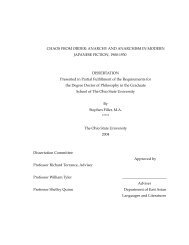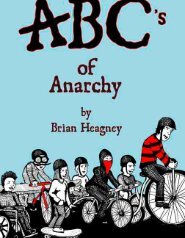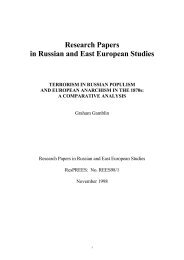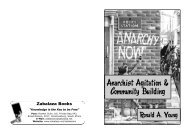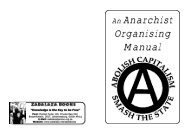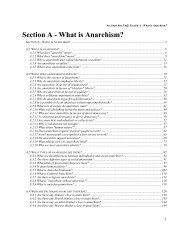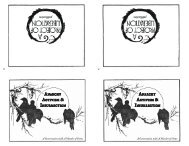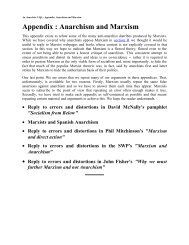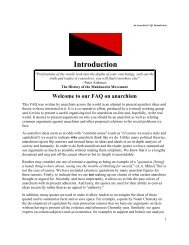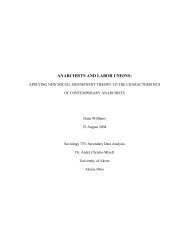Anarchy Works.pdf - Infoshop.org
Anarchy Works.pdf - Infoshop.org
Anarchy Works.pdf - Infoshop.org
You also want an ePaper? Increase the reach of your titles
YUMPU automatically turns print PDFs into web optimized ePapers that Google loves.
economy<br />
<strong>Anarchy</strong> <strong>Works</strong><br />
specialized support. It said that it would have been<br />
impossible for anyone without previous training to<br />
operate the radios in such a short amount of time,<br />
because the equipment is too sophisticated for just<br />
anyone to use. They were wrong.37<br />
Who will take out the trash?<br />
If everyone is free to work as they choose, who will take out the<br />
trash or perform other undesirable jobs? Fortunately, in a localized,<br />
anti-capitalist economy, we could not externalize, or hide, the costs<br />
of our lifestyle by paing someone else to clean up after us. We would<br />
have to pay for the consequences of all our own actions-rather than,<br />
for example, paying China to take our toxic waste. If a necessary<br />
service like garbage disposal were being neglected, the community<br />
would quickly notice and have to decide how to handle the problem.<br />
People could agree to reward such work with small perks-nothing<br />
that translates into power or authority, but something like getting<br />
to be first in line when exotic goods come into town, receiving a<br />
massage or a cake or simply the recognition and gratitude for being<br />
a stand-up member of the community. Ultimately, in a cooperative<br />
society, haVing a good reputation and being seen by your peers as<br />
responsible are more compelling than any material incentives.<br />
Or the community could decide that everyone should involve<br />
themselves in these tasks on a rotating basis. In an anti-capitalist<br />
economy, an activity like garbage collection does not have to define<br />
anyone's worklife. Necessary tasks no one wants to perform can<br />
be shared by everyone. So instead of a few people having to sort<br />
through garbage their entire lives, everyone who was physically<br />
able would do it for just a couple hours each month.<br />
The Christiania "free state" is a quarter in Copenhagen,<br />
37 Ditto, interview with Francisco.<br />
Denmark, that has been squatted since 1971. Its 850 inhabitants are<br />
autonomous within their 85 acres. They have been taking out their<br />
own trash for over thirty years. The fact that they receive about<br />
one million visitors a year makes their achievement all the more<br />
impressive. The streets, buildings, restaurants, public toilets, and<br />
public showers are all reasonably clean-especially for hippiesl The<br />
body of water that runs through Christiania is not the cleanest, but<br />
considering that Christiania is tree-covered and automobile-free<br />
one suspects most of the pollution comes from the surrounding city<br />
that shares the waterway.<br />
Residents have built dozens of the houses now standing in<br />
Christiania using innovative eco-designs. They also use<br />
solar power, wind power, composting and a whole<br />
host of other eco-friendly innovations. A method of<br />
filtering sewage through reed beds, which means<br />
water coming out of Christiania is as clean as that<br />
coming out from the rest of Copenhagen's treatment<br />
plants, has helped the commune be shortlisted for a<br />
pan-Scandinavian award for ecological living.33<br />
Different people interviewed had different conceptions of how<br />
Christiania was kept clean, suggesting a sort of dual system. A<br />
newcomer said that you cleaned up after yourself, and when you<br />
felt like doing some extra picking up, you did. An old-time resident<br />
who was more involved in decision-making explained there was<br />
a garbage committee, answerable to the "Common Meeting,"<br />
responsible for the bottom-line of keeping Christiania clean, though<br />
clearly voluntary assistance and cleanliness by all the residents was<br />
the first line of defense.<br />
38 Cahal Milmo, "On the Barricades: Trouble in a Hippie Paradise," The<br />
Independent, May 31, 2007.<br />
90<br />
91



